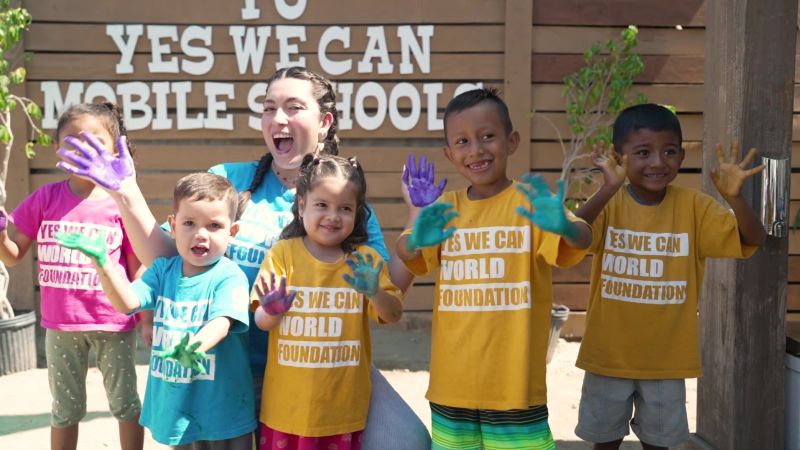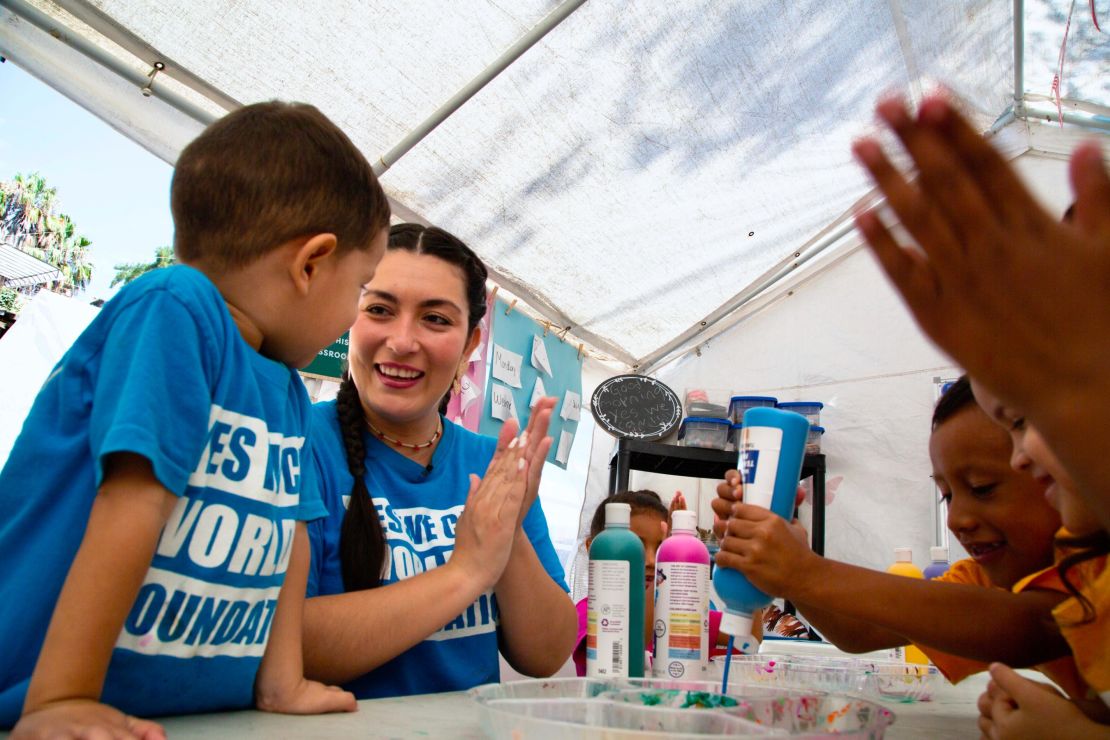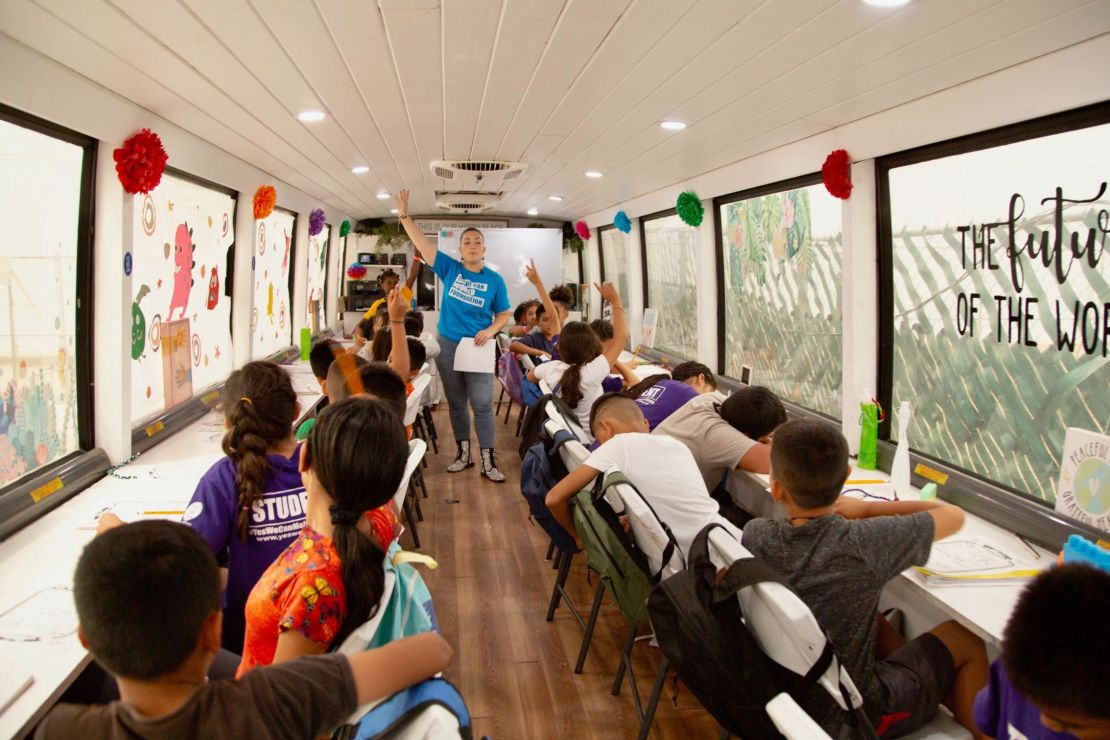
For hundreds of migrant children living in shelters at the border, this CNN Hero’s mobile classrooms offer education and stability
- International
- December 10, 2023
- No Comment
- 287
Tijuana, Mexico
Newsportu
—
Estefanía Rebellón knows the trauma that stems from being forced to flee your home for safety. She understands the fear and uncertainty felt by the more than 70 million migrant and forcibly displaced children around the world.
She was a migrant child, too.
“My family’s case is the case of many refugees and migrants at the border. It was never a choice for our family to leave our home. We were forced out of it,” Rebellón, 32, said.
She was 10 when her family fled Cali, Colombia, because of death threats to her father, who had been forced into hiding. They settled in Miami, and with the support of teachers at school, Rebellón thrived. Now, through her nonprofit, Yes We Can World Foundation, she provides education for children living in limbo in shelters at the US-Mexico border.
Rebellón moved from Miami to Los Angeles when she was 21 to pursue an acting career. In 2018, she was so moved after volunteering in migrant camps in Tijuana that she put her career on hold.
“There were no schools set up to help these kids. They were walking around the camps barefoot,” she said. “I couldn’t forget about what I had just seen. And I was like, ‘I literally have to go back.’”
Rebellón and her partner, Kyle Schmidt, used about $1,000 of their savings to buy tents and supplies and set up a makeshift school at the border. They enlisted volunteer teachers to provide learning opportunities in the camps.
“We set up a school overnight and … told just a couple of kids,” Rebellón said. “It spread throughout the camp, and we had like over 50 kids surrounding us.”
In the months that followed, when those families living in the camps were moved to shelters, Rebellón and Schmidt wanted to continue offering educational services.
“I thought, “Why don’t we turn a bus into a mobile classroom, and we could take it to all the different shelters?” Rebellón said. “We literally just Googled and YouTubed how to convert a bus into a mobile classroom.”
Over the next year, Rebellón and Schmidt bought and gutted a bus, partnered with shelters, and drove the transformed bus over the border. Their goal: to provide bilingual educational programs to keep children in school.
“All the families that we work with and all the children that we work with on a daily basis are legally seeking asylum,” Rebellón said. “They’re going through all the processes that are being required of them.”
Rebellón’s organization hires professional teachers and tailors their curriculum to the specific needs of each student. The program has been accredited by the education secretary in Mexico and serves children ages 3 to 15 – a crucial period for education, Rebellón says.

Despite the challenges she faced as a migrant child, she says she was lucky to have teachers who advocated for her and guided her along the way.
Many migrant children do not have this support and often fall through the cracks and miss valuable school time. Many have been on the road for months, if not years, and have difficulty attending school because they are often in transit, without a permanent home. Safety, economic instability, poverty, lack of transportation, and perceived legal status are also factors.
“People don’t realize that this is such a long process for families,” Rebellón said. “It’s not just like you arrive at the border, you seek asylum, and your life is all rainbows. It takes decades and a lot of work and a lot of pain.”
Rebellón’s family navigated a decades-long legal process to obtain political asylum and later US citizenship. Her parents, both lawyers by trade, were forced to abandon their careers in Colombia and take on new jobs in the US to support their family of five. Her mother worked multiple jobs as a caregiver and her father worked nights at Walmart. He has worked there full time for nearly 20 years.
“Any time I get a chance, I share my immigration story with (the kids),” Rebellón said. “I always want the kids that come through our programs to realize that being a migrant is not something they need to be ashamed of.”

Today, Yes We Can Foundation educates 250-300 kids a day through its four school locations along the border and three mobile school buses. Since 2019, Rebellón says the group has served more than 3,100 migrant children from 10 countries.
Their program runs Monday through Friday from 9:00 am to 3:00 pm. School runs for the entire year, with no summer breaks. They also provide free uniforms, backpacks, and school supplies. Lessons focus on common core instruction in the subjects of language arts, math, and science as well as addressing practical and immediate needs like how to translate basic information including phone numbers and addresses.
“I want our efforts to be something permanent,” Rebellón said. “And that when it’s all said and done, we will be proud to look back and say that we were there when people needed us the most.”
Want to get involved? Check out the Yes We Can World Foundation website and see how to help.
To donate to Yes We Can World Foundation via GoFundMe, click here
#hundreds #migrant #children #living #shelters #border #Newsportu #Heros #mobile #classrooms #offer #education #stability








